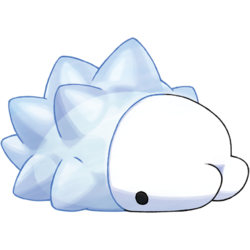From Bulbapedia, the community-driven Pokémon encyclopedia.
Snom (Japanese: ユキハミ Yukihami) is a dual-type Ice/Bug Pokémon introduced in Generation VIII.
It evolves into Frosmoth when leveled up with high friendship during the night.
Biology
Snom is a small caterpillar Pokémon. It has a round white body. It has two small black dot eyes. There are two round pincers. Four small legs are located underneath its body. On its body are transparent spikes.
Snom can spit out a thread imbued with frigid energy. It uses the thread to tie its body onto a branch in order to disguise itself as icicle while sleeping. Snom's diet consists of eating snow that is piled up on the ground. The spikes on its back grow bigger and more impressive with the more snow that Snom consumes.
In the anime
Major appearances
Minor appearances
In the manga
In the TCG
- Main article: Snom (TCG)
Game data
Pokédex entries
| This Pokémon was unavailable prior to Generation VIII.
|
| Generation VIII
|
|
|
Galar
#349
|
| Sword
|
It spits out thread imbued with a frigid sort of energy and uses it to tie its body to branches, disguising itself as an icicle while it sleeps.
|
| Shield
|
It eats snow that piles up on the ground. The more snow it eats, the bigger and more impressive the spikes on its back grow.
|
|
|
Game locations
| This Pokémon was unavailable prior to Generation VIII.
|
|
|
Held items
Stats
Base stats
| Stat
|
Range
|
| At Lv. 50
|
At Lv. 100
|
30
|
|
90 - 137
|
170 - 264
|
25
|
|
27 - 84
|
49 - 163
|
35
|
|
36 - 95
|
67 - 185
|
45
|
|
45 - 106
|
85 - 207
|
30
|
|
31 - 90
|
58 - 174
|
20
|
|
22 - 79
|
40 - 152
|
Total: 185
|
Other Pokémon with this total
|
- Minimum stats are calculated with 0 EVs, IVs of 0, and (if applicable) a hindering nature.
- Maximum stats are calculated with 252 EVs, IVs of 31, and (if applicable) a helpful nature.
|
Type effectiveness
| Under normal battle conditions in Generation IX, this Pokémon is:
|
|
|
|
|
|
|
|
|
|
|
|
|
Learnset
|
|
|
|
- Bold indicates a move that gets STAB when used by Snom
- Italic indicates a move that gets STAB only when used by an Evolution of Snom
|
|
|
|
|
- Bold indicates a move that gets STAB when used by Snom
- Italic indicates a move that gets STAB only when used by an Evolution of Snom
|
|
|
|
|
- Moves marked with an asterisk (*) must be chain bred onto Snom in Generation VIII
- Moves marked with a double dagger (‡) can only be bred from a Pokémon who learned the move in an earlier generation.
- Moves marked with a superscript game abbreviation can only be bred onto Snom in that game.
- Bold indicates a move that gets STAB when used by Snom
- Italic indicates a move that gets STAB only when used by an Evolution of Snom
|
|
|
|
|
- Bold indicates a move that gets STAB when used by Snom
- Italic indicates a move that gets STAB only when used by an Evolution of Snom
|
Evolution
Trivia
- No other Pokémon have the same type combination as Snom and its evolved form.
- Snom has the lowest base stat total of all Ice-type Pokémon.
Origin
Snom may be based on a jewel caterpillar. Snom may also draw some inspiration from the larvae of the Gynaephora genus of alpine or Arctic moths. One particular species, the arctic woolly bear moth, can enter a dormant state that allows it to endure temperatures as low as -158 degrees Fahrenheit.
Name origin
Snom may be a combination of snow, worm, and nom (slang for eating).
Yukihami may be a combination of 雪 yuki (snow) and 食み hami (eating).
In other languages
| Language
|
Title
|
Meaning
|
 Japanese Japanese
|
ユキハミ Yukihami
|
From 雪 yuki and 食み hami
|
 French French
|
Frissonille
|
From frisson and chenille
|
 Spanish Spanish
|
Snom
|
Same as English name
|
 German German
|
Snomnom
|
From snow and nom
|
 Italian Italian
|
Snom
|
Same as English name
|
 Korean Korean
|
누니머기 Nunimeogi
|
From 눈 nun and 먹이 meog-i
|
 Mandarin Chinese Mandarin Chinese
|
雪吞蟲 / 雪吞虫 Xuětūnchóng
|
From 雪 xuě, 吞 tūn, and 蟲 / 虫 chóng
|
 Cantonese Chinese Cantonese Chinese
|
雪吞蟲 Syuttānchùhng
|
From 雪 syut, 吞 tān, and 蟲 chùhng
|
|
|
|
|
|
|
|
Related articles
External links

|
This Pokémon article is part of Project Pokédex, a Bulbapedia project that aims to write comprehensive articles on each Pokémon species, as well as Pokémon groups and forms.
|



